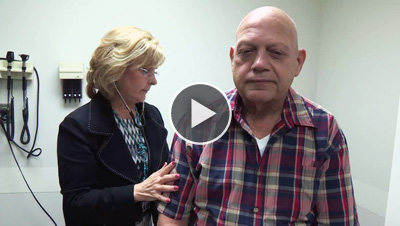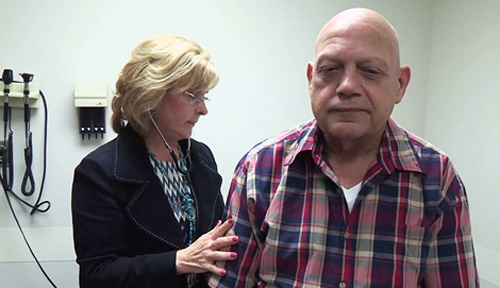 |
| VIDEO: Randy Whisnant travels from North Carolina to participate in the trial. |
UNMC is testing a drug that has been fast-tracked for approval by the Food and Drug Administration because of its dramatic results in patients with mantle cell lymphoma and other cancers.
The study, which aims to enroll as many patients as possible, is being conducted in about 50 locations across the United States and in Puerto Rico.
“This experimental drug, Ibruitinib, is so promising that the FDA gave it fast-track designation, which rarely happens,” said Julie Vose, M.D., chief of the division of hematology and oncology and Neumann M. and Mildred E. Harris Professor at UNMC. “Patients who’ve been on the treatment have had remarkable results with limited side effects. We are able to offer this to patients through an expanded access program which occurs about six months before the FDA approves it.”
The new study is targeted for patients age 18 and older with mantle cell lymphoma who have relapsed — meaning other treatments have failed. Those eligible for the study will be provided the drug at no cost.
|
“We don’t think it’s a cure, but it’s been found to be able to keep patients in remission longer to control their symptoms and allow them to have a good quality of life.” Julie Vose, M.D. |
The FDA designated Ibruitinib as a breakthrough therapy, which expedites its development and review. The study will remain open until the medication is FDA approved, Dr. Vose said.
Dr. Vose, principal investigator of the UNMC study, said Ibruitinib works differently than other drugs for this type of cancer. The drug, developed by Pharmacyclics, Inc., and Johnson & Johnson’s Janssen Pharmaceutical division, basically poisons one of the pathways that helps the cancer grow.
“It kills the lymphoma,” she said. “It has fairly limited side effects. It’s a pill rather than an intravenous delivery, and it also has potential to be used with other treatments due to the limited side effects.”
Mantle cell lymphoma is a rare, B-cell non-Hodgkin lymphoma that most often affects men over the age of 60. The disease may be fast or slow growing.
Dr. Vose said results thus far have seen a 75 percent response rate in patients with mantle cell lymphoma whose disease has failed all other treatments.
“We have been involved in several of the first clinical trials with this particular medication,” Dr. Vose said.
“We don’t think it’s a cure, but it’s been found to be able to keep patients in remission longer to control their symptoms and allow them to have a good quality of life. This is a breakthrough and works very quickly.”

This is wonderful.